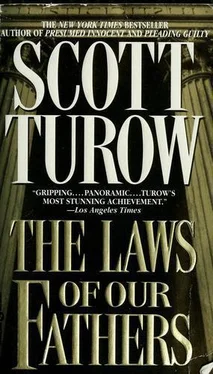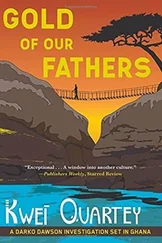Scott Turow - The Laws of our Fathers
Здесь есть возможность читать онлайн «Scott Turow - The Laws of our Fathers» весь текст электронной книги совершенно бесплатно (целиком полную версию без сокращений). В некоторых случаях можно слушать аудио, скачать через торрент в формате fb2 и присутствует краткое содержание. Жанр: Криминальный детектив, на английском языке. Описание произведения, (предисловие) а так же отзывы посетителей доступны на портале библиотеки ЛибКат.
- Название:The Laws of our Fathers
- Автор:
- Жанр:
- Год:неизвестен
- ISBN:нет данных
- Рейтинг книги:5 / 5. Голосов: 1
-
Избранное:Добавить в избранное
- Отзывы:
-
Ваша оценка:
- 100
- 1
- 2
- 3
- 4
- 5
The Laws of our Fathers: краткое содержание, описание и аннотация
Предлагаем к чтению аннотацию, описание, краткое содержание или предисловие (зависит от того, что написал сам автор книги «The Laws of our Fathers»). Если вы не нашли необходимую информацию о книге — напишите в комментариях, мы постараемся отыскать её.
The Laws of our Fathers — читать онлайн бесплатно полную книгу (весь текст) целиком
Ниже представлен текст книги, разбитый по страницам. Система сохранения места последней прочитанной страницы, позволяет с удобством читать онлайн бесплатно книгу «The Laws of our Fathers», без необходимости каждый раз заново искать на чём Вы остановились. Поставьте закладку, и сможете в любой момент перейти на страницу, на которой закончили чтение.
Интервал:
Закладка:
Charlie! something within me shrieks. The thought of him remains impossible. It's like some trauma I can never fully recall – a bad fall, a beating. With Charlie, what I can't recollect is what I ever saw in him. I remember as a fact, like the capitals of the fifty states, that for many years I felt under his spell. But he was a cad. Autocratic. Self-absorbed. I reestablish that point a hundred times each day. This morning, waking up, I had a clear memory of how often I was scratched by his toenails in bed at night. No matter how reasoned my appeal, he refused to cut them.
'And what did he do?'
'You mean to irritate me?'
'No. That's a short list, right? Guys are so predictable: he didn't love you enough, he didn't pay enough attention, he got hung up on someone else.'
'Right, right, and right,' I say.
'No, how'd he make money? Doctor, lawyer, Indian chief?' 'A poet.' 'No way.'
'It's true. He didn't make much money. He's got a teaching appointment at a university near Cincinnati now. But there was a long period while we were together when he refused to teach. He had a feud at the English department. He was a mailman then.' We've made a full circuit of the walk. Three blocks from the courthouse and the depleted south rim of the Center City, the lower shapes of a struggling residential area rise up: mercados, taverns, shingle-sided frame houses, the wonderful gilded church spire of the Serbian church, notched like a key to the gates of heaven.
'So he hooked up with a rich lawyer, huh?'
I laugh at the idea. 'No, Charlie never approved of my legal career. Rules. Forms. Those are the kinds of particulars he always thought were trivial. "The detritus of living." That's from one of his poems. Even when I was a prosecutor, he didn't see the point of what I was doing.'
'He wanted the guilty to go free?'
‘I think he just would have preferred to banish them. Ship them all elsewhere. Make it go away. That was Charlie's usual approach to a problem.'
I had always thought I saw life more or less Charlie's way and was shocked to discover that the law was the sort of thing for which I had some gift. A few times in my last term of law school, I went to court. I was working with the State Defenders Office, allowed under local procedure to stand up in court on little misdemeanor cases. Once, afterwards, I went to the food store from the courthouse, and there as I was looking at the shining clustered heads of a pint of blackberries, I realized that what I had been doing a few minutes before, my ease in addressing a judge, begging mercy for the wretched and the weak, was quite beyond Charlie, who was anguished with words, not merely in his poems, but even in contemplating what might be spoken in his classroom to eighteen-year-olds who for the most part wanted no more wisdom from him than some surefire way to get through English I. Somehow this thought of our relative abilities had never come to me in precisely that fashion. I was accustomed, in fact, to thinking of Charlie as possessed of something empyrean and magical, the stuff, if not of genius, at least of art, but now, in the grocery, I suddenly took heart from my moment at the rostrum, from my exchange of sharp words with the grubby prosecutor and the dutiful wag of the judge's head, granting my forlorn client a generous sentence of ninety days' probation. And the thought had followed then, part of an inevitable sequence, that in a certain worldly way I was stronger than Charlie, I was hardier, the better survivor. And all that seemed remarkable was how unsurprising it was; I had known this always, and none of it, I recognized, had occurred unwillingly.
'Was your breakup bitter?' Seth asks.
I just make a sound at the recollection. Across the oval, I recognize another runner, Linda Larsen, Judge Bailey's clerk, and I wave.
'I'm bitter about Charlie. But not my marriage. I'm actually beginning to see it as a useful phase for both of us. It got Charlie away from Rebecca. His first wife. No one should be stuck with Rebecca. And it got me through my illness. He proposed to me when I had no hair from the radiation.'
'You had no hair and he had a wife?'
'Exactly.'
'Modern,' he says.
'Post-modern,' I answer. 'Sometimes, when I'm in the dumps about it, I wonder of course.' 'About what?'
'About whether I meant to leave Charlie all along. You know, did I always know my marriage was doomed?'
He appears confused.
'I mean my mother,' I say. 'Okay? I was raised by this woman alone. And here I am doing the same thing. And I wonder if I didn't feel a certain destiny there. The older I get, the more like her I'm afraid I am.'
'You're nothing like her, Sonny. Nothing.' Even as we continue moving, he reaches across and grips my wrist urgently, much as I gripped his. His green eyes are enlarged. 'She was cra-zy.'
As if pierced by an airborne spear, I am suddenly revisited by the pain of that – remembering how weird everybody thought Zora was. I could never stand to say it to myself, that Zora was not ordinary, not right. Tiny, walleyed from a childhood accident with firecrackers, she spoke with urgency and volume, always regaling me with memorized quotations from writers of leftist spirit, Walt Whitman through Maud Gonne, and free-association gossip about figures from the labor movement. She was on a thousand obscure quests. She prowled junk shops and used-book stores seeking treasures – apothecary bottles, button boxes, squared-off paperclips with little wire curlicues, writings that were lost: a rare translation of Ruben Dado's Songs of Life and Spirit; George Eliot's Felix Holt, the Radical. She always addressed me in lavishly endearing terms – 'my precious darling,' 'my treasure' – and at the best moments – often! – it was true. To be the object of all of Zora's galvanic passion was to stand at the center of the world. But there were other times when she was, in the perfect phrase, carried away.
She once lost me in the maelstrom she provoked at a local P ‘I A meeting, where she had appeared to rail against the inclusion of the words 'under God' in the Pledge of Allegiance. In that era, when men didn't baby-sit and working women were not expected to spend their earnings on child care, I was often in tow, at organizing meetings, steering-committee debates. I played with dolls beneath the dining-room tables and was comforted with nickel Cokes, while my mother and the others furiously argued doctrine and smoked unfiltered cigarettes. But on this night Zora was not among friends. Instead, alone but for me, she confronted the neighborhood of lunch-pail tradesmen in which she'd been raised in Kewahnee. I was a thin, dark child in my cousin's cast-off cardigan and skirt, clutching a rag doll and some hem of my mother's apparel. Zora gestured wildly, her unraveled voice emerging with expectorant pops at ear-splitting volume as she screamed into a microphone. Ultimately, she was hated from the room: 'Get out, you little Polack nut. You godless Commie bitch. Go back to Moscow.' Amid the brandished fists, the agitated throng, I was suddenly alone, pushed along, but uncertain Zora had even noticed I was missing. The moment went on and on. I stood there shrieking, Mommy! Then I was retrieved, almost absentmindedly, snatched up by Zora as she turned heel to reply to someone with foul-mouthed invective.
That's what Seth and I saw in each other, though neither of us knew it then. We both had come of age with parents who weren't in the swing, exiles from the mainstream.
'Tell me about your daughter,' he says eventually. That is always pure pleasure. We talk at length. Her costumes. Her moods. The glories of kindergarten. Heading back, we cross the arc of the concrete overpass above the highway and jog through the little Italian neighborhood, where there are still bakeries with dark awnings and sub shops with a crucifix or Sacred Heart over the tables. At this hour, the row of restaurants – Jenna's, Mama Sesta's – are full of a bustling pack of lawyers and courthouse employees. A few tables will remain occupied by men and women who, by whatever whim of fortune, can drink the afternoon away. A grey-haired man, wearing a short-sleeve shirt despite the cold, stands on the walk before his tiny home, suspiciously eyeing everyone and enjoying a cigarette.
Читать дальшеИнтервал:
Закладка:
Похожие книги на «The Laws of our Fathers»
Представляем Вашему вниманию похожие книги на «The Laws of our Fathers» списком для выбора. Мы отобрали схожую по названию и смыслу литературу в надежде предоставить читателям больше вариантов отыскать новые, интересные, ещё непрочитанные произведения.
Обсуждение, отзывы о книге «The Laws of our Fathers» и просто собственные мнения читателей. Оставьте ваши комментарии, напишите, что Вы думаете о произведении, его смысле или главных героях. Укажите что конкретно понравилось, а что нет, и почему Вы так считаете.












